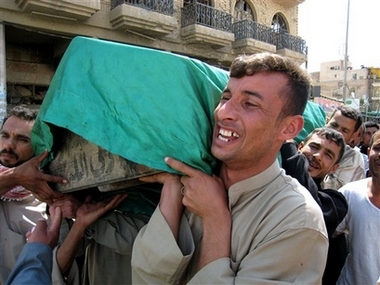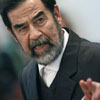Dozens killed in revenge attack in Iraq
(AP)Updated: 2007-03-29 08:41
BAGHDAD - Shiite militants and police enraged by deadly truck bombings went on a shooting rampage against Sunnis in a northwestern Iraqi city Wednesday, killing as many as 70 men execution-style and prompting fears that sectarian violence was spreading outside the capital.
Gen. Khourshid al-Douski, the Iraqi army commander in charge of the area, said 70 were shot in the back of the head and 40 people were kidnapped. A senior hospital official in Tal Afar, who spoke on condition of anonymity out of security concerns, said 45 men were killed.
Outraged Sunni groups blamed Shiite-led security forces for the killings. Prime Minister Nouri al-Maliki's office ordered an investigation and the US command offered to provide assistance.
Ali al-Talafari, a Sunni member of the local Turkomen Front Party, said the Iraqi army had arrested 18 policemen accused in the shooting rampage after they were identified by Sunni families. Shiite militiamen also took part, he said.
The revenge killings among Shiites in the religiously mixed city 260 miles northwest of Baghdad were triggered by truck bombings in Tal Afar on Tuesday that killed 80 people and wounded 185.
Al-Douski said one of the trucks exploded after the driver lured people in a predominantly Shiite neighborhood to the site by telling them he was distributing free flour from a humanitarian organization. The bombing caused surrounding buildings to collapse, leaving huge piles of concrete and bricks dusted with white flour.
Videotaped footage from the scene was broadcast Wednesday night showing a man dead in the front seat of his car. Men and women carried the limp bodies of children powdered with flour. Others dug through the rubble with their bare hands in a search for survivors.
The revenge killings coincided with the US Senate debate Wednesday on a bill that would set a spring 2008 timetable for withdrawing American troops. Democrats in Congress are acting on growing voter impatience with the war, but Bush declared the deadline would have disastrous repercussions.
The hard-line Sunni Association of Muslim Scholars said the revenge killings were evidence "of the clear plot and coordination between the militias and the government forces of interior and defense." The Iraqi Accordance Front, the biggest Sunni parliamentary group, said the killings proved the need for an overhaul of Iraq's Shiite-dominated system.
"If yesterday's attacks were carried out by unidentified terrorists, today's events were conducted by well-known criminal policemen and they must be punished," Sunni lawmaker Dhafer al-Ani said. "The whole situation in Iraq needs to be reconsidered and a quick solution is needed to the political process."
Tal Afar, about 90 miles east of the Syrian border, is mainly populated by
ethnic Turks, with Shiites making up about 60 percent of the 200,000 residents.
| 1 | 2 |  |
|
||
|
||
|
|



